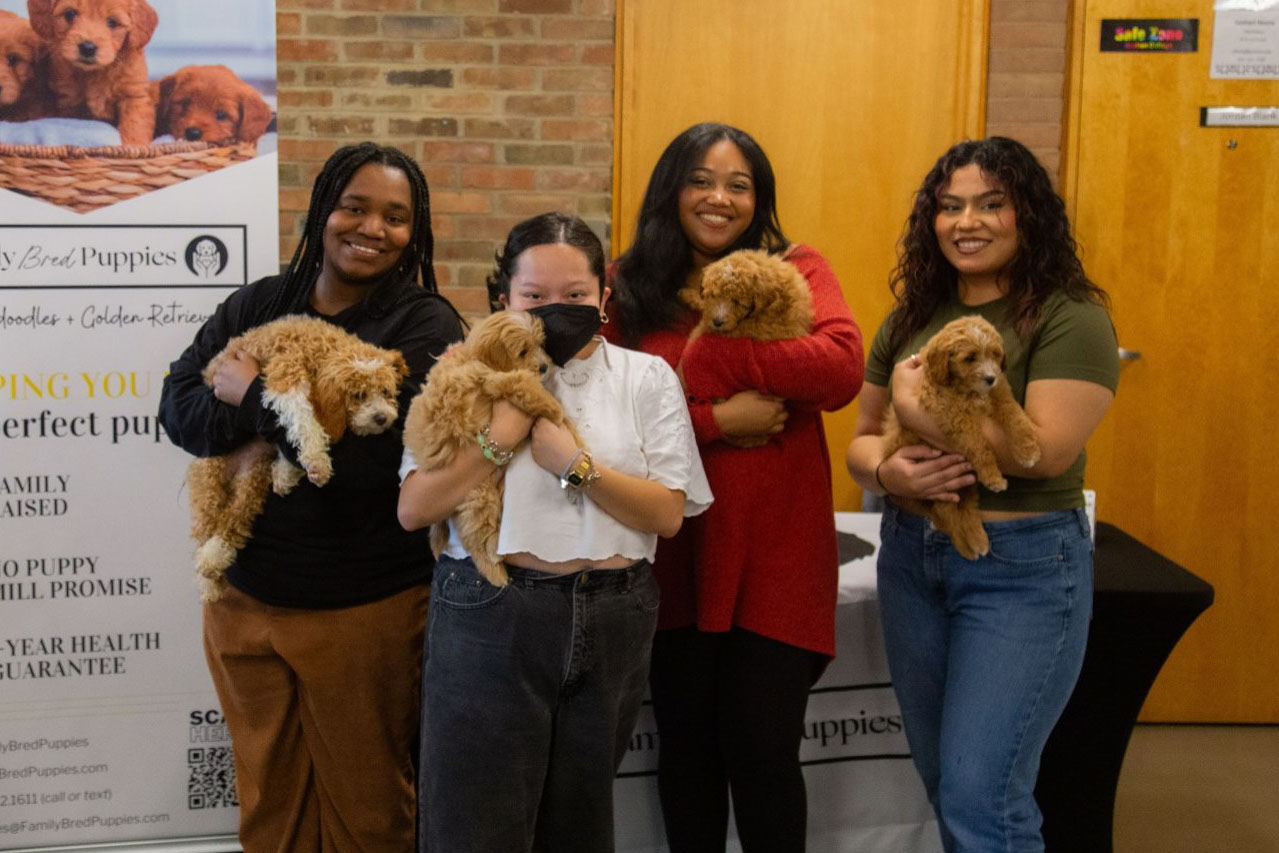Last week, students gathered to experience a variety of diverse music and dance at the Intercultural Student Dance, one of the many on-campus collaborations with other affinity groups that the Black Student Union has actively brought to campus.
“It’s been rewarding to see these events connect people from different backgrounds,” said Jakyra Green, a senior English and secondary education major, and the current BSU president.“What’s even more rewarding is to see the number of Black students and faculty participating. When Black people come together, we do so with love and togetherness.”
In addition to their continued involvement with other affinity groups and clubs at GC, the BSU has consistently proven to be one of the most active groups on campus, especially over the course of the last few years.
Some of their most notable events include their annual convocation, cookout and Puppy “De-Stress” events which will be returning to campus on April 22.
Throughout the school year, BSU has also encouraged students to be active participants in the world around them by creating space in their calendars for intentional conversation and various advocacy efforts.
The most recent example of this is their campaign for African countries experiencing genocide.
BSU provided hands-on education for individuals on campus through an interactive display of support and solidarity.
Participants were given the opportunity to visit the library and create solidarity pins, scan a QR code leading to educational resources and leave a stamp of their fingerprint on the display, with each fingerprint resulting in a 25-cent donation to organizations contributing on-the-ground work.
Current BSU leadership includes Green, Mariela Esparza, a senior English major, Kennedy Stewart, a sophomore elementary education major and Isis Espinoza, a senior TESOL and education major.
The current BSU advisor is Aja Ellington, the director of diversity, equity and inclusion.
Green shared a common misconception made about the BSU, and an invitation for those who may have been misinformed: “BSU welcomes everyone. There is a misconception that intercultural groups are exclusive to people who identify with that group. If a meeting is just for Black students or faculty, we’ll specify.”
She continued, “But I think it’s important that people surround themselves with those who are different. Limiting your circle to what’s familiar stops you from learning and growing in meaningful ways.”
Green finishes by saying, “Show up in big and small ways — attend BSU meetings, advocate for us, uplift our voices, etc. If you claim to be an advocate, ally or whatever, support us. Do the work.”
The current vice president, Stewart, expressed a similar sentiment: “Show up to events. Actively support and use your voice. Know who your student leaders are and know what they look like. Advocate for your own club, and every other club, too. There is a lot that we are doing, and that we can be doing. But we can’t do that if our voices are not being heard.”
BSU is not a stranger to empowering student voices, as described by aspiring BSU leader, Kaitlyn Johnson, a freshman nursing major: “The BSU is more than a club. It is a family. Your voice is heard. You can say what you mean, you can say what you want to see. You will gain a lot from attending their events. You will learn a lot.”
Stewart also reflected on her role and the roles of the other BSU leaders saying, “I am proud of what I am doing. It is so important for Black individuals at this institution to see people who say, yes I am here. We are going to continue to be here. We are not going away. We want to be heard. We are going to be seen.”
Stewart continued, “As the only other Black member of BSU leadership, I want to highlight Kyra’s efforts. The way she speaks up in rooms and uses her voice is amazing. It has made me less fearful to use my voice.”
Stewart further reflected on leadership, stating, “Also, Mariela and Isis’ ability to step into their leadership positions and hear us, and listen to us, as individuals who are not Black, has been incredible.”
Reflecting on her role as a leader of the BSU, Esparza described her hopes for the future: “I hope that the work that Nakiyah and Kyra have done can continue through the work of the younger students. I am really grateful for their revival of the BSU over the course of their time here.”
Esparza continued, “I am excited to see Kennedy continue the work that she is doing. I hope that she, along with future leadership, remember why they are doing the work that they are.”
Though Stewart is only a sophomore, her hope is to continue the work of those who came before her in her own unique way. “I hope I can lead the BSU guided by my own vision, but also lead and guide it in the way it was left to me, as well.”
Green, who will be graduating alongside Esparza and Espinoza at the end of this semester, said, “My hope for Black people at GC is that they can find a sense of belonging in whatever way that looks like for them. It may not and doesn’t have to be through the Black Student Union, but I hope they know that eventually, there are places where they’ll find a sense of safety and belonging. It’ll take time, but they will.”
Green continued, “I’m grateful for the wonderful people I have met during my time at GC, especially through BSU. Although there are too many to name, I’d like to acknowledge two Black women.
“The previous BSU president, Nakiyah Kilpatrick, and the upcoming president, Kennedy Stewart, have both inspired me in different ways.
“They have made a difference in the Black community and will undoubtedly continue to do so.”




